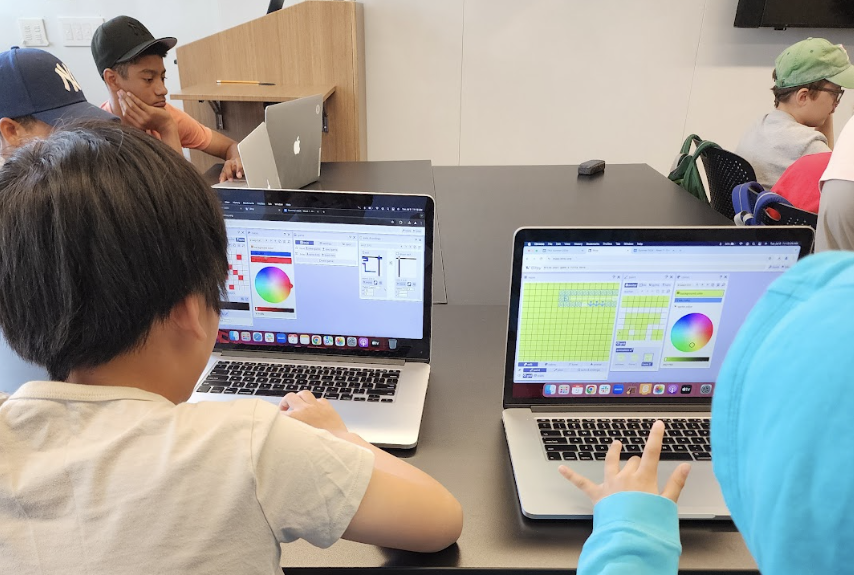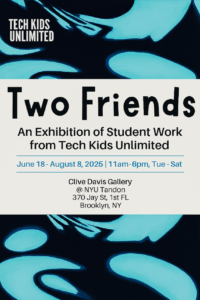Education Science & Health Technology
Honing neurodivergent learners’ tech skills
By Leane Kwon
Computers hum. Students click through animations. Roars of excitement burst out as someone’s code project finally works.
This isn’t your typical coding class. It’s a classroom built for 10- to 24-year-olds diagnosed with learning disabilities, including autism, attention-deficit hyperactivity disorder, executive function disorder and sensory challenges.
Those dozen or so neurodiverse learners of Tech Kids Unlimited were scattered around the room that summer day, some designing pixel art for a video game, others sketching storyboards for an animation.
Based at the New York University Tandon School of Engineering, Tech Kids Unlimited, an educational nonprofit founded in 2009, teaches digital media skills such as video game design, stop-motion animation and coding. In the process, the project aims to give students a sense of belonging and ability that some may not experience in traditional classrooms.
“What we use for our pedagogy is a combination of design thinking, project-based learning, explicit instruction, and Universal Design for Learning,” explained Tech Kids Unlimited founder Beth Rosenberg, who has worked in education for over 35 years. “That means the burden of learning is on the teacher, not the student.”
The classrooms include a tech teacher, assistants, counselors and often a grad student in social work. “It’s usually about a 4-to-1, student-to-adult ratio,” Rosenberg noted. “Sensory-friendly tools like fidgets and visual schedules are available throughout the day. Students are free to chew gum or use sensory aids without needing to ask.”
“It’s a community where neurodiverse students grow personally, professionally and socially through the power of digital technology,” said board member Harrison Lung, interim treasurer at Tech Kids Unlimited.
Using technology tools, computer science concepts, and social-emotional learning aimed at helping them establish relationships and move smoothly through society, the organization works to ignite unlimited futures by helping neurodiverse students get jobs later on in life and succeed in school. Through their programs, students explore the creative power of tech by designing video games, stop motion films, and animation, while building confidence and developing work readiness skills in a fun and supportive environment.
Rosenberg has taught everything from museum education at the Guggenheim to digital media programs at the Eyebeam Center for Art & Technology. But having a child who is neurodiverse inspired her to found Tech Kids Unlimited. “The personal is political,” Rosenberg said. “Something that affects you personally also affects other people in the world, and it just becomes a bigger issue.”
She couldn’t find an after-school program suitable for her son, she said. In 2009, she gathered 12 neurodiverse students from her community in a borrowed media lab at a community center in Manhattan to create stop-motion animations. “After that, parents said, ‘This is a great program and we want more.’” She continued running sessions during school breaks and eventually expanded it into its current programming in 2014.
In March, the students’ work was showcased at the Marvels of Media exhibition at the Museum of the Moving Image. Visitors explored retro-inspired platformer games featuring characters that jumped across pixelated cityscapes and solved simple puzzles, all designed by students from the project’s Digital Agency, a work readiness program where students take on real-world creative tech projects such as building games and developing digital art portfolios. For many, it was the first time their work had been shared publicly, making it a moment of pride for students and families alike.
“Digital Agency helped me navigate how to communicate on the computer,” a 17-year-old said.
Students also learn animation, music production, digital art, video editing, and virtual reality, all using open-source tools tailored to their strengths. These hands-on projects build tech skills while encouraging collaboration and self-expression.
Currently, their work is also featured in “ Two Friends,” an exhibition at NYU’s Clive Davis Gallery that runs through Aug. 8. It includes digital art, posters, VR stations, and a digital art wall, with a section on documentary films created through the project’s Career Ladder program.
Beyond tech skills, Tech Kids Unlimited prioritizes growth in confidence, independence and identity. “We’ve seen students grow in self-advocacy, time management, collaboration, and confidence,” Rosenberg said. One student shared, “I learned how to accept feedback from others, respect people’s opinions, and work with my teammates.”
A 19-year-old student said, “I hope to go to college or learn more technology skills… Tech Kids Unlimited has helped me in job skills, like, working on our resumes.”
Starting in September, the organization will rebrand as Tech Unlimited to reflect the belief that neurodiverse students are more than just kids.



